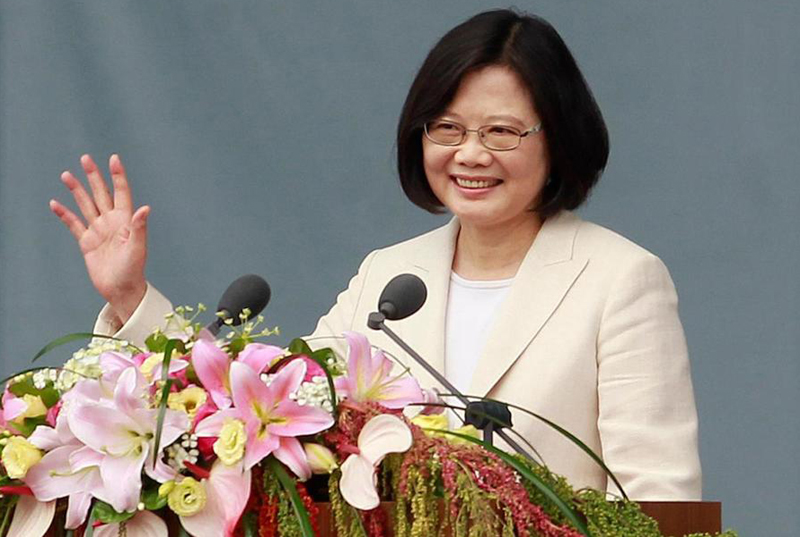 Taipei — Tsai Ing-wen has been sworn in as the new president of Taiwan, becoming its first female leader and saying her people "committed to the defence of our freedom and democracy as a way of life".
Taipei — Tsai Ing-wen has been sworn in as the new president of Taiwan, becoming its first female leader and saying her people "committed to the defence of our freedom and democracy as a way of life".
The ceremony got off to a traditional start: At 9am local time, Tsai appeared with exiting president Ma Ying-jeou. Vice president Chen Chien-Jen appeared beside Tsai at the ceremony. A military parade and a display of Taiwanese history are being held in the capital in celebration.
The event involves thousands of military personnel as well as schoolchildren and artistic performances. After Tsai's ceremonial acceptance, the island's aboriginals were honored, with members of various ethnic tribes performing a folk dance. Then, rock bands played songs in Mandarin and Taiwanese.
In her inaugural speech, she said Taiwanese people had shown they were "committed to the defence of our freedom and democracy as a way of life". Democracy and freedom to the world mean openness and collectivism in the 21st century, so the 23 million people of Taiwan will likely continue to trust Ms Tsai, for .
The message seems clear to China, where a decade-old totalitarian regime, has no option but to implement the only idea, to continue its threat of military action against the Island. However, Tsai said in her speech that she respected the "joint acknowledgements and understandings" reached between the sides at a landmark 1992 meeting seen by China as underpinning all subsequent contacts and agreements.
However, since Xi Jinping took office, many governmental and non-government organisations have reported an increase in political repression, serious human rights violations and restrictions on Human rights defenders, lawyers, journalists, writers and activists in China, Tibet and other regions.
But, this is also a clear message to Beijing that Taiwanese people cherish these characteristics of their society and their self-rule more than economic ties with China. The "stable and peaceful development of the cross-Strait relationship must be continuously promoted", she said, calling on both sides to "set aside the baggage of history, and engage in positive dialogue, for the benefit of the people on both sides".
What may also irk China is her focus on Taiwan's democracy and freedom - saying it's every Taiwanese person's responsibility to safeguard this. A recent poll shows, most Taiwanese do not subscribe to the "one China" policy, or the idea that Taiwan is part of China, a survey conducted by the Taiwan Cross-Strait Policy Association showed.
According to the survey, 59.7 percent of respondents said that president-elect Tsai Ing-wen "should not state in her inauguration speech that both sides [of the Taiwan Strait] belong to 'one China,' while 22 percent said she should," association secretary-general Anson Hung told a news conference in Taipei.
"Asked if they think Tsai should give in if China openly threatens to reduce the number of Chinese tourists to Taiwan, 60.4 percent said they still believed that she should not say Taiwan and China are parts of 'one China,' while 24.7 percent said she should," Hung said.
Tsai also made no explicit mention of the concept that Taiwan is a part of China, which Beijing says is crucial to the entire relationship. Tsai called for Taipei and Beijing to "set aside the baggage of history, and engage in positive dialogue, for the benefit of the people on both sides."
However, The democratically elected President of Taiwanese people said her administration would "work to maintain peace and stability" in relations between the sides. However, she added that Taiwan's democratic system and the will of its 23 million people must be respected in the course of cross-strait dialogue.
She has shown her bravery by addressing cross-strait policy and Taiwan’s relationship with China. In her speech, Tsai referred to Taiwan as a "Country" 24 times, which is sure a positive message to her Taiwanese people and the rest of the world, to anger the Chinese communist regime in Beijing.
But, in April, Taiwan accused China of carrying out "gross violation of basic human rights" after 45 Taiwanese were deported from Kenya to mainland China. They were then paraded on Chinese state TV confessing to crimes they had been acquitted for in Kenya.
The government of Tsai's predecessor Ma Ying-jeou repeatedly endorsed the one-China principle and so-called "'92 consensus." During its eight years in power, Ma's government reached a series of economic and civil agreements significantly increasing interactions between the two sides.
China forcefully maintains that Taiwan must unify with China eventually, even by military force if necessary. However, Taiwanese public opinion is strongly against any sort of political union between the sides, instead favoring the status of de facto independence and robust social and economic interactions.


![Tibet has a rich history as a sovereign nation until the 1950s when it was invaded by China. [Photo: File]](/images/stories/Pics-2024/March/Tibet-Nation-1940s.jpg#joomlaImage://local-images/stories/Pics-2024/March/Tibet-Nation-1940s.jpg?width=1489&height=878)















